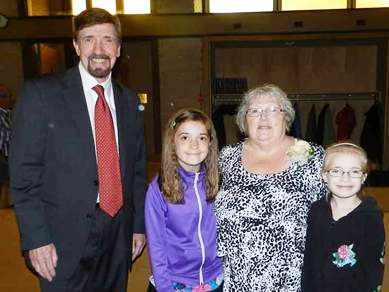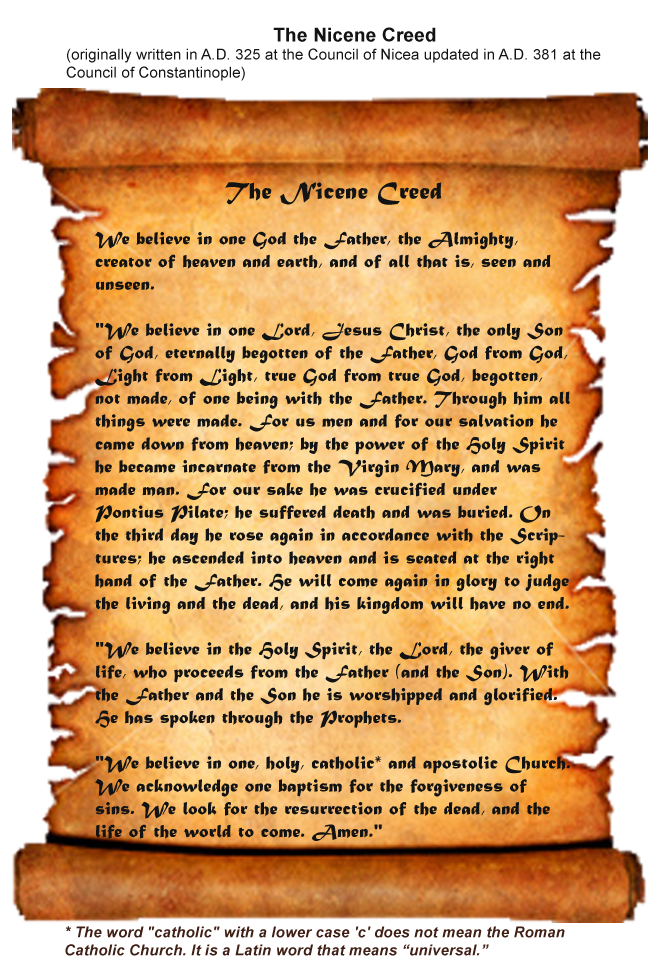GCI’s St. John’s, Newfoundland, Canada congregation recently celebrated its 40th anniversary with 40 members in attendance (see top picture, below). Angela White, who is one of the original members, is shown in the bottom picture along with John Adams and Angela’s grandchildren. John, who is a retired GCI pastor, formerly pastored the St. John’s church, attended with his wife Edna. Also attending where Neil Earle, who pastors the Glendora, California church and his wife Susan, who serves as the registrar for Grace Communion Seminary. It was a rich celebration, with a sermon from John and an update from Neil. Former pastor David Sheridan sent a message of congratulations.
Year: 2013
Cathy Deddo
Last week, prayer was requested for Cathy Deddo following the death of her mother. Here is a note of thanks from Cathy:
I am grateful to all those of the GCI family who have written me and have prayed for me and my family at this time of loss and grief at the passing of my mother. Thank you for including me as a member of this wonderful family. I have felt so supported and encouraged by all the loving words from everyone. Thank-you again.
Do grace and law conflict?
Dear Brothers and Sisters in Christ,
God has provided a wonderful plan of salvation, based not on human merit but on his grace (Ephesians 2:8-9). This word “grace” has become shorthand for Christians. Some understand its meaning well, while others seem to view it as being in conflict with the idea of law. “Now that we are under grace, do we have to keep the law?” is a question Christians have asked for nearly 2,000 years. Paul addressed this question in his letter to the churches in Rome:
So what do we do? Keep on sinning so God can keep on forgiving? I should hope not! If we’ve left the country where sin is sovereign, how can we still live in our old house there? Or didn’t you realize we packed up and left there for good? That is what happened in baptism. When we went under the water, we left the old country of sin behind; when we came up out of the water, we entered into the new country of grace—a new life in a new land! (Romans 6:1-3 The Message).
According to Paul, this “new life” in a “new land” is not lawless. It is not “law” or “grace” as though the two are opposed. Instead, the word “grace” should be understood as representing the many parts or aspects of God’s whole plan of redemption. God’s grace has always included within it a call for the response of an obedience that trusts in (has faith in) God’s grace.
It is often stated that the old covenant is “law” while the new covenant is “grace.” Though this shorthand way of thinking is not totally inaccurate, it can lead to the unfortunate idea that law and grace are totally at odds. But what we see in Scripture is that the old covenant was not graceless and the new covenant is certainly not lawless. Instead, what we find are two forms of God’s one gracious covenant with the Old Testament presenting the promise and the New Testament presenting its fulfillment in Christ. Each of these has its particular form of obedience corresponding to its particular form of covenantal grace.
Under the new covenant form of grace, we live by the law of Christ that is written on our hearts. Paul refers to that law as “the law of the Spirit” (Romans 8:2) and “the law of Christ” (Galatians 6:2). These new covenant references equate the law with the will and heart of God, which is shared with us as his children by the Spirit of Christ. As we submit to God’s will and are moved by his heart, we experience the freedom that we have been given from the condemning effect of sin. Note this related comment from Trinitarian theologian Andrew Purves concerning the covenanted way of response to God’s grace found in both the old and new covenants:
God knew that Israel would not be able to be faithful as God required. Thus, God, within the [old] covenant established and maintained unilaterally by God, freely and graciously gave a covenanted way of responding so that the covenant might be fulfilled on their behalf.
Israel was given ordinances of worship designed to testify that God alone can expiate guilt, forgive sin and establish communion. This was not just a formal rite to guarantee propitiation between God and Israel, however. By its very nature, the covenanted way of response was to be worked into the flesh and blood of Israel’s existence in such a way that Israel was called to pattern her whole life after it.
Later, in the prophecies of the Isaiah tradition especially, the notions of guilt-bearer and sacrifice for sin were conflated to give the interpretative clue for the vicarious role of the servant of the Lord. It would take the incarnation actually to bring that to pass, however, for Jesus Christ was recognized and presented in the New Testament both as the Servant of the Lord and as the divine Redeemer, not now only of Israel, but of all people. Jesus Christ has fulfilled the covenant from both sides, from God’s side, and from our side (from the paper “I yet not I but Christ: Galatians 2:20 and the Christian Life in the Theology of T. F. Torrance”).
Purves’ insights help us appreciate the age-old Christian axiom: “Jesus did it all,” while also answering Francis Schaeffer’s famous question: “How should we then live?“ Unfortunately, some think grace means living any way we want. Some, objecting to that conclusion, insist that we obey all 613 laws of the Torah. But neither of these responses to grace is God’s will for us as followers of Jesus. As Paul explained, we are called to die daily, letting Christ live in us through the Holy Spirit. As we yield to Christ, we experience his kingdom reign and share in his obedience to the Father’s will including what he is doing to fulfill the Father’s mission to the world. As noted by Thomas F. Torrance, we live out the obedience of faith in Christ’s fulfillment of the heart and good will of God for us:
It is only through union with Christ that we partake of the blessings of Christ, that is through union with him in his holy and obedient life… Through union with him we share in his faith, in his obedience, in his trust and his appropriation of the Father’s blessing (Theology in Reconstruction, 158-9).
To help us understand the important relationship between law and grace, we have included in this issue an essay by Dr. Gary Deddo in which he discusses this topic from an Incarnational, Trinitarian perspective (click here or the “Grace and obedience” link under “Contents”). I think you will find his essay both challenging and informative.
Your brother in Christ,
Joseph Tkach
GCI Ethiopian mission
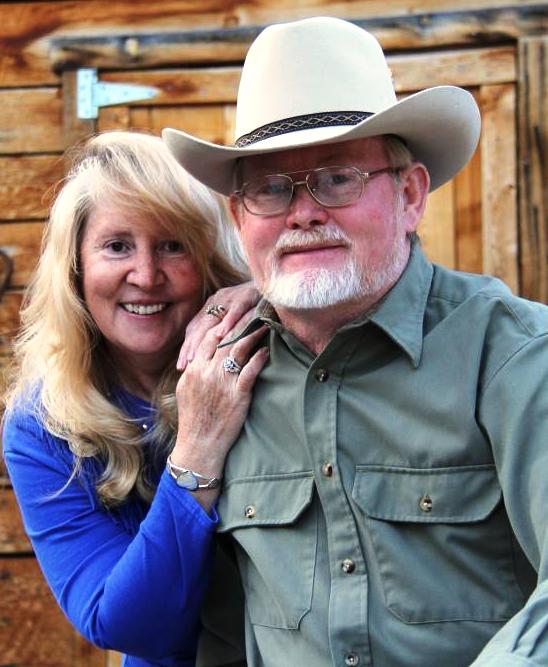
Please pray for Cliff and Mary Snyder, leaders of the GCI Generations Ministries M25:40 Missions organization.
Cliff and Mary, who live in Colorado, have conducted several mission trips to Ethiopia over the past six years. Mary left this week on a trip to Ethiopia where she will minister at orphanages in partnership with various pastors and missionaries. She also will be connecting with the young people that M25:40 is helping obtain a college education.
Cliff and Mary hope to invite others to join them on a mission trip to Ethiopia next year. While on the current trip, Mary will be making arrangements. If you are interested in the 2014 Ethiopian mission trip, email Mary at msnyder72003@yahoo.com.
Mary and Cliff ask for your prayers concerning Mary’s current trip and preparations for the 2014 trip.
Rannie Childress
Rannie Childress recently was named senior pastor of GCI’s congregation in Attalla, Alabama (he will be installed in a ceremony in October). GCI ministry developer Ted Johnston interviewed Rannie and Bob Miller, the congregation’s former pastor and Rannie’s mentor. The video below excerpts that conversation, telling Rannie’s story—an amazing testimony to the goodness and power of God.
On YouTube at http://youtu.be/HtONous96LM.
Becky Valekis honored
Becky Valekis, wife of GCI pastor Jim Valekis, serves as an elder and ministry leader in GCI’s Tipp City, Ohio congregation. Becky recently received a major “Spirit of Innovation” award from the president of Wright State University where she is employed as assistant director of annual giving. To learn more about this prestigious award, watch the video below. Congratulations Becky for this well-deserved honor!
On YouTube at http://youtu.be/_8QHLAjEoVE.
Death of Cathy Deddo’s mother

We are saddened to learn of the recent death of Cathy Deddo’s mother Mary Allin. Cathy is the wife of Gary Deddo who serves as Joseph Tkach’s special assistant.
Mary, who lived in Falls Church, Virginia, is survived by her husband, George Allin, Jr. and by six children, including Cathy.
Members of the family were with Mary near the time of her death. Cathy reports that “signs of God’s grace were plenteous.”
Cards for Gary, Cathy and her family may be sent to:
Grace Communion International Attn: Gary Deddo PO Box 5005 Glendora, CA 91740Marty Davey
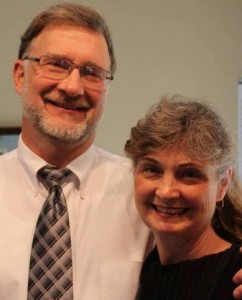
Marty Davey, who pastors GCI congregations in Jacksonville, Florida and Woodbine, Georgia was born in North Carolina but spent much of his early years moving between Florida and Tennessee. “This was due to my mother having open-heart surgery several times, beginning when she was age 30. My parents had to depend on proximity to their parents since I was one of four kids and our mother was usually ill. She was one of the original patients of Dr. Michael DeBakey in Houston who pioneered open-heart surgery. His surgeries were successful and my mother lived to be 67. She died in 2004.”
Though Marty grew up in a Baptist family, he shared that “we did not often attend worship or practice our beliefs. After struggling through my high school life with troublesome behaviors and relationships, I left home in Tennessee at 17, moved in with my grandparents in Florida and there began turning to Jesus to straighten out my life. I started reading the Bible during my senior year in high school and started worshipping with WCG in Gainesville, Florida in January 1976. I was baptized in June 1976.”
Marty went to Ambassador College in 1977 and there met Australian native Yvonne Verwater. They graduated from Ambassador College in 1981 and were married in August that year. They just celebrated their 32nd anniversary. They have three children, Amanda (Rick) Larson, Michael and Michelle.
Hired upon graduating from AC, Marty and Yvonne began their ministry in Houston, Texas. Since that time they have served as assistant pastor or associate pastor in Charleston, West Virginia; Cincinnati, Ohio; Mount Poconos, Pennsylvania; Muncie and Richmond, Indiana (their first assignment as a senior pastor) and since 1995 in Jacksonville, Florida and Woodbine, Georgia.
“Sharing God’s love and Jesus’ beautiful teachings with others,” is Marty’s favorite part of being a pastor. His most memorable moments include, “baptizing my three children and coming to see Jesus more clearly in his New covenant.” What he loves most about being part of GCI is, “being around the sincerely committed members and ministers as, together, we live out our new life in Christ.”
Speaking of Yvonne, Marty says, “Yvonne has been and still is, the perfect pastor’s wife: always faithful, deeply caring about the parishioners and serving others with a wonderful spirit of teamwork and humility. She presently coordinates the preteen children’s Sunday school program in our Jacksonville church and is a great encourager and source of wisdom. While she is active and supportive in church ministry, she maintains her own identity, interests and relationships, which help her to have a balanced and healthy outlook on life and ministry.”
In his free time Marty loves to fish. “I like fishing for real fish almost as much as I like fishing for disciples, but I’m not very good at either—yet.”
When asked about a mentor, Marty said, “I have learned many good things from all six of the pastors under whom I’ve served. Probably the most helpful mentoring came from Hal Baird, the first pastor who trained me. He was one of the kindest, warmest and most caring pastors one could imagine. His approach showed me what true ministry looked like.”
Marty says he feels closest to God “when prayerfully reading his word, or when peacefully observing the beauty of nature around me.” Regarding his passion, Marty said, “I like everything good in life and hope to stay around as long as possible in reasonable shape. I really like being human, so far, though I am excited about the new model as well!”
Turning activity into efficiency
Though we understand the importance of time alone with God, sometimes ministry activity crowds it out. Wayne Stiles, in an article posted on the SonLife Live 2/6 Network (9/9/13), writes about the “one thing” that Jesus did to keep his priorities straight, turning “activity into efficiency.”
 I’ve noticed an unsettling habit in my life. Whenever I find myself with a free moment, I feel compelled to fill it with something productive. Because I hate to waste time, I fill it with activity and justify it as productivity. But I’m learning that constant movement doesn’t represent efficiency. It could, moreover, represent just the opposite.
I’ve noticed an unsettling habit in my life. Whenever I find myself with a free moment, I feel compelled to fill it with something productive. Because I hate to waste time, I fill it with activity and justify it as productivity. But I’m learning that constant movement doesn’t represent efficiency. It could, moreover, represent just the opposite.
As with every other part of the human experience, Jesus remains our model of efficiency. But His life—even before the cross—was no easy walk:
- The demands on Him were constant.
- The needs He faced were overwhelming.
- The expectations He encountered were unrealistic.
No person was ever more qualified to do it all, and yet Jesus took life in the fast lane in stride. What was His secret?
Jesus’ Secret to Efficiency
At the end of a busy day of ministry, Jesus’ work followed Him home: “And when evening had come, after the sun had set, they began bringing to Him all who were ill . . . And He healed many who were ill with various diseases” (Mark 1:32-34).
Ready for a shock? Notice they brought “all” who were ill, but Jesus only healed “many.” The One who could have done it all, chose not to. Here’s why: “In the early morning, while it was still dark, He arose and went out and departed to a lonely place, and was praying there. And Simon and his companions hunted for Him; and they found Him, and said to Him, ‘Everyone is looking for You.’ And He said to them, ‘Let us go somewhere else to the towns nearby, in order that I may preach there also; for that is what I came out for’” (Mark 1:35-38).
Jesus, more than any other person, could have met the physical needs of all the people that day, but He chose not to. Why? Because Jesus’ priority was to preach, not to heal. Therefore He could say no—without guilt—to legitimate needs in order to focus His time.
The “One Thing”
When we try to do too much we buy into the lie that says the more we do the more productive we are (and the more significant we are). But the more we do, the poorer job we do. Hardly efficiency! Better to do one thing well than to do many things poorly. At the Judgment Seat of Christ, Jesus will evaluate us based the quality of our work—and our motives—not on the quantity (1 Corinthians 3:13). One thing. Jesus wasn’t the only one who practiced this wise principle:
- David prayed: “One thing I ask of the Lord, this is what I seek . . .” (Psalm 27:4).
- Paul wrote: “This one thing I do . . .” (Philippians 3:13).
This “one thing” was the same for David as it was for Paul—and as it was for Jesus. Giving priority to one’s relationship with the Father helps bring all other priorities in line. There’s no other way you’ll know what to let go and what to keep. “The secret of concentration is elimination,” wrote Dr. Howard Hendricks.
The One Thing that Changes Your Activity to Efficiency
Don’t fall for the lie that a “good Christian” never says no to legitimate needs. Even Jesus said no. Saying no doesn’t mean you have no compassion. No one had more compassion than Jesus. But prioritizing simply means you’re focusing where God would have you focus—just like Christ did.
Jesus made it a priority—as should we—to devote time alone with the Father. Why? It helps you refocus and regain perspective on your life. Time with God helps you say no to good things by revealing God’s will for your life.
Refusing to do the many good things you can do allows you to do the one thing you must do.
Rather than cram every available moment with activity and call it efficiency, let’s remember what Jesus did. Since He could have done it all, but chose not to, how much more so should we who can’t do it all, choose not to?
Holy Spirit: person or power?
Dear Brothers and Sisters in Christ,
Some claim that the Holy Spirit is an impersonal power. But viewing him in that way falls far short of what the New Testament teaches, undermining a full understanding of one of the most exciting and encouraging dimensions of our relationship with God.
In teaching about the Holy Spirit, the New Testament uses analogies related to both power and personhood. But why the mixture? If the doctrine of the Trinity is so important, why didn’t the New Testament authors spell it out more clearly?
It’s important to remember that the Bible was written within a particular cultural setting where some things were understood without detailed explanation. It’s the same today. If I mention “Monday morning quarterbacking” to Americans, most know what I mean without elaboration. But people unfamiliar with American football culture would not understand.
As we read what the Bible says about the Holy Spirit, we need to ask, are we expecting it to answer questions that were not questions in its original cultural setting? Would the original audience have assumed without further explanation that the Holy Spirit was personal and acted as a powerful agent? Scripture shows us that the answer is yes.
There are many places in Scripture where the Holy Spirit is referred to in personal terms. In John 16:14, Jesus refers to the Spirit using a personal (rather than a neuter) pronoun, saying “He will glorify me.” In Acts 15:28, the apostles spoke of the Spirit in personal terms when they said “It seemed good to the Holy Spirit and to us.” The characteristics of a person are assumed by the biblical authors when they spoke of the Holy Spirit acting as do human persons: teaching, comforting, guiding, giving, calling and sending. They spoke of the Spirit as being resisted (Acts 7:51), argued with and personally replied to (10:14-20), grieved (Ephesians 4:30) and lied to (Acts 5:3-9). They also spoke of the Spirit distributing gifts according to his own will (1 Corinthians 12:11).
The early church recognized that “Holy Spirit” was used throughout Scripture as a proper name, just as are “Father” and “Son.” Jesus indicates that all three are personal names when he directs his disciples to baptize in “the name of the Father and of the Son and of the Holy Spirit” (Matthew 28:19). This command hearkens back to Jesus’ own baptism where the Father, the Son and the Spirit were each personally present (Matthew 3:13-17).
Jesus distinguished the Spirit from himself in a personal sense when he said, “I tell you the truth; it is expedient for you that I go away for if I go not away, the Comforter [Paraclete] will not come unto you; but if I depart, I will send him unto you” (John 16:7 KJV). Jesus regarded the Holy Spirit not as an effect (comfort) but as a person who brings comfort (the Comforter).
In saying that he would send the Holy Spirit, Jesus distinguished the Spirit from himself and the Father in a personal sense: “But the Counselor [Paraclete], the Holy Spirit, whom the Father will send in my name, he will teach you all things and will bring to your remembrance all that I have said to you” (John 14:26 RSV). “When the Counselor [Paraclete] comes, whom I shall send to you from the Father, the Spirit of truth who proceeds from the Father, he will bear witness to me” (John 15:26 RSV).
Because the name Paraclete is unfamiliar to us (my spell-check keeps asking if I mean “parakeet”!), English Bibles translate it as Counselor, Helper, Advocate or Comforter. But these translations fall short in conveying the name’s full meaning. Those who spoke Koine Greek understood Jesus’ meaning—they recognized that Jesus was speaking in personal terms when referring to “the Paraclete,” just as he was speaking in personal terms when referring to “the Son” and to “the Father.” Though these personal names were revolutionary, they were not ambiguous.
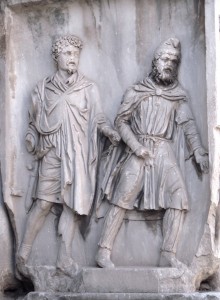 In the ancient world, paracletos often was used in a legal sense—like our words advocate, attorney or lawyer (though likening the Spirit to a lawyer might not go down so well today!). Paracletos also was used in a military sense. Greek soldiers went into battle in pairs, standing together as they fought off the enemy. The Greeks called this trusted soldier and friend a paraclete. So when the first disciples heard Jesus refer to the Spirit as the Paraclete and speak of him otherwise in personal terms (as in Acts 1:5, 8), Jesus’ meaning would have been apparent to them without further explanation.
In the ancient world, paracletos often was used in a legal sense—like our words advocate, attorney or lawyer (though likening the Spirit to a lawyer might not go down so well today!). Paracletos also was used in a military sense. Greek soldiers went into battle in pairs, standing together as they fought off the enemy. The Greeks called this trusted soldier and friend a paraclete. So when the first disciples heard Jesus refer to the Spirit as the Paraclete and speak of him otherwise in personal terms (as in Acts 1:5, 8), Jesus’ meaning would have been apparent to them without further explanation.
From the beginning, the early church was functionally and implicitly trinitarian. Like Jesus, it spoke of the Father, the Son and the Spirit using personal terms. However, as Christianity spread, other teachings arose. Church leaders had to counter heretical teachings concerning the nature of Jesus Christ and the Holy Spirit and the relationships between the divine persons. Out of these debates came the doctrine of the Trinity, which was formalized in the Nicene Creed (shown below) where the Father, Son and Spirit are presented as unique divine persons who are inter-personally related. Note this comment from Thomas Torrance:
A definite doctrine of the Trinity was found to arise out of a faithful exegetical interpretation of the New Testament and out of the evangelical experience and liturgical life of the Church from the very beginning. It made explicit what was already implicit in the fundamental deposit of faith. It was with the formulation of the homoousion [meaning “of one being”—the term used in the Nicene Creed] clarifying and expressing the essential connection of the Son to the Father upon which the very Gospel rested, and with the application of the homoousion to the Holy Spirit to express his oneness in being with the Godhead of the Father, that the theological structure of the Trinitarian understanding of the Godhead unfolded and established itself firmly within the mind of the Church (The Trinitarian Faith, p. 199, emphasis added).
Though the Nicene Creed made explicit the personhood of the Father, the Son and the Spirit, some Western thinkers (particularly since the Enlightenment) have explained God’s nature in impersonal, mechanistic and creaturely ways, including saying that the Holy Spirit is not God, but an impersonal power that emanates from God. But impersonal explanations of God’s nature always fall short. Why? Because God is not a creature, nor is he a mechanism. His true nature as a tri-personal, relational God is known only by revelation, from Jesus, recorded in Scripture. There the Holy Spirit is revealed as the Paraclete—a divine Person who is personal just as are the Father and the Son.
Grounded in this stunning revelation, we may think, speak, worship and act with assurance, knowing that the Holy Spirit is God just as the Father is God and the Son is God. One God; three persons: blessed Trinity!
Your brother in Christ,
Joseph Tkach
PS. For more on this topic I recommend these articles at GCI.org and The Surprising God:
- The Deity of the Holy Spirit (http://www.gci.org/God/deityHS)
- Is the Holy Spirit God? (http://thesurprisinggodblog.gci.org/2011/06/is-holy-spirit-god.html)
- The Eternal Spirit—an article in a series on the Nicene Creed (http://thesurprisinggodblog.gci.org/2011/11/eternal-spirit-nicene-creed-7.html)
For an eye-opening study on the Bible’s cultural context, see the book, Misreading Scripture with Western Eyes by Richards and O’Brien.



